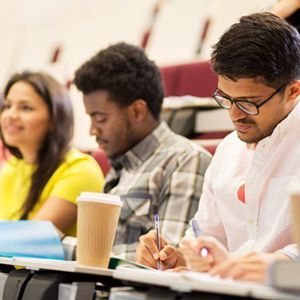It’s 8.15 am on a Saturday, at the end of November. We – the examiners – arrive 45 minutes before the scheduled start time (better safe than sorry), and yet some of the candidates have beaten us to it and are already waiting in the foyer, and even at the door of the room where the DELE A2 Spanish exam is due to take place. This exam is organized by the Instituto Cervantes, and the UCH has been collaborating with them as an exam centre for some years now.

On this occasion there are sixteen candidates, from different locations within the Valencia Region (the Comunitat Valenciana) and Catalonia. Their appearance and names reveal their origins: the Arab-speaking world, Pakistan, India or, in some cases, Eastern Europe. Very probably, these people have decided to sit this exam in order to be able to apply for Spanish nationality. Possessing an official Spanish language certificate at least A2 level was made a compulsory requirement for Spanish nationality applications in 2016, by means of Order JUS/1625/2016, of 30 September, on the procedure for the award of Spanish nationality via residency.
Passing another exam known as the CCSE, which concerns knowledge of the Spanish constitution and Spanish culture, is also a requirement in this respect –candidates can also sit this exam at the UCH.
On the day of DELE A2 exam, we know what our demeanour has to be: we must steel ourselves to be objective, particularly when the time comes to assess oral expression and interaction. Although such information is not normally requested during the test, whose structure is established by the Instituto Cervantes in excruciating detail, most candidates delight in telling us about their personal circumstances, often grinning while they do so: why they live in Spain, what jobs they have, who they live with, where they live, and even what their lives were like in their countries of origin. Many now live in Catalonia – the high demand often means that the examination centres there are overbooked – and they tell us that they have travelled through the night to get to Alfara del Patriarca on time. Google Maps and similar programmes make things a bit easier for them! I still keep the business card of one of our former candidates: he very kindly said that, if I should ever visit Barcelona or needed any help there, I should come to his phone and internet café. With this backdrop, it is very difficult to assess candidates’ speaking ability in accordance with the descriptors contained in the analytical and holistic scoring scales, which are laid down by the Instituto Cervantes and based on CEFR criteria. But we have to be professional, leave aside our human sympathy, and play the role required of us, which we are qualified to perform: official language examiners.
On the days following a DELE A2 exam, the DELE examiners at the Languages Service feel particularly lucky to do what we do. And changing back into the groove of our everyday work with undergraduate students makes us think about the things our job adds to our lives: teaching languages, and particularly being a language examiner, gives you insights into the lives and experiences of all kinds of people. This enriches us all, both personally and professionally.




